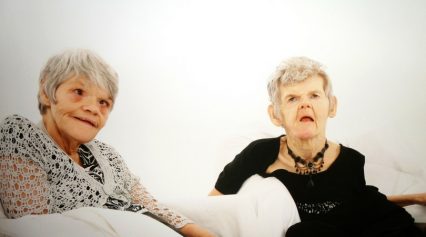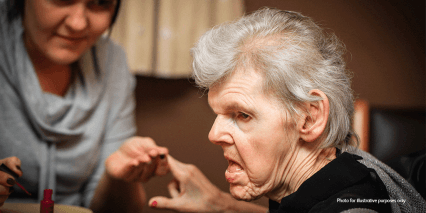Maggie and Doreen: a lifelong journey to independent living
Maggie and Doreen’s lives are chapters from our social history. As more and more authorities abandon independent living in favour of large scale care facilities for people with learning disabilities and autism, we hope Maggie and Doreen’s story will help them think again.

The pair, who have learning disabilities and complex physical needs, first met when they were placed in a large asylum in Sheffield together in the 1930s.
They instantly hit it off, providing a friendly, reassuring face for each other through some tough times.
Their friendship survived the war, rickets, German measles and general malnourishment. They shared a bedroom with 13 other people. Maggie would often be pulled around in a cot.
There was little opportunity to leave the building and people with fewer physical disabilities would often help support others because staff numbers were so low.
This was Maggie and Doreen’s life for over 40 years.
Separated in hospitals
As part of the national policy to close asylums in the 1980s, the pair were transferred to a hospital together.
However, they were put in different rooms and for a while were even on separate wards.
Shared bedrooms, clinical settings, little stimulation and few opportunities to leave the hospital meant that the experience was worse, rather than better, for the two ladies.
A step towards independence
Care in the Community followed, and with it a move to a 6-bedroomed residential home during the 1990s.
A private bedroom each, four other housemates and higher staffing levels really gave Maggie and Doreen the chance to take their first steps to more independent living.
It was certainly the first chance they were given to make their own choices and to join the local community.
Challenges were overcome. Maggie loved her privacy and initially refused to leave her own room.
Doreen took time to get used to sleeping in the dark – the lights were never off at night in the institutions. Staff successfully supported both ladies through these and many other hurdles.
When we first met the friends
Dimensions first met the ladies when we took over their service from the incumbent provider.
We introduced innovative (for that time) ideas such as person-centred support planning and the pair began to really see a positive difference in their lives.

For the first time they were involved in the recruitment process, choosing staff to support them who matched their own interests and needs.
Martin Bowler, the Assistant Locality Manager for their service said: “Things became so different for them both, in such a positive way.
The person-centred approach meant that they gained control of how they were supported and their community involvement.
“We took the time to really get to know them both and see their very bubbly personalities.
In the past, they had been dismissed because they do not speak; nobody had taken the time to find alternative ways to communicate with them.
Getting to know them
We were able to learn all about their needs and wants – which included wanting their own house.”
Maggie loves anything ‘posh’ and has been supported to visit Claridges in London several times where she enjoys being called ‘Madame Maggie’.
Her bedroom is filled with ornate furniture and pretty jewellery. She chooses to furnish her room with designer items and enjoys going to spas.
Doreen is an adventurous person. She loves to visit Blackpool, goes to the cinema and has been on several holidays including cruises and Disneyland Paris.
But what is so great to see is their true friendship and love for one another – they have been through thick and thin together and the banter between them is incredible.
Moving into their own home together
This year, their dream of moving into their own home finally came true. Martin said: “Walking into the new bungalow for the first time was so emotional. Doreen was jumping around in her wheelchair and Maggie had tears in her eyes.
“The move was so exciting. It was amazing to be able to support Maggie and Doreen to achieve their dream, and to work with them to decorate it to their tastes.
But it does feel a little bittersweet because for the majority of their lives they haven’t had the opportunity to really enjoy life to the full.”
Living in a smaller property together means they have more one to one time with their support staff allowing them to have much more freedom to choose their activities and immerse themselves in their community, which has led to a growth in both ladies’ confidence levels.
Both have travelled on a tram for the first time and they go to the theatre and on days out to safari parks together.
Individually, Maggie has found a good local hairdresser and Doreen has been supported to complete the Race for Life.
The difference made by having their own home has been evident to their support team. The ladies are much happier, they’re smiling more and they are full of laughter!
They know each other inside out, and as all friends do, have the odd argument.
Moving forwards
But what is truly inspiring is that after years of being left in institutions, where they were treated poorly and their opinions went unheard, they finally have the life they deserve.
Dimensions wants everyone we support to have the opportunity to decide where they live and with whom.
For Maggie and Doreen this has meant moving into a shared house, but for others it may mean living alone or moving back to be closer to their family home.
No-one – no-one – chooses to move into big care homes or back into institutions.
Austerity may be provoking cost cutting measures in some parts of the country but if Maggie was your mum- which chapter from her life would you demand?



